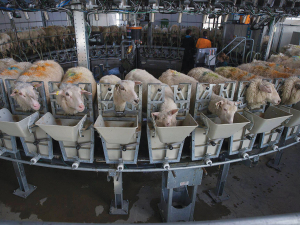Maui Milk achieves grass-fed certification in NZ
Sheep milk processor Maui Milk has achieved grass-fed certification of milk supply against the AsureQuality Grass-Fed Scheme.
 Maui Milk has asked its suppliers to end their milking season a month early as global demand for products wane.
Maui Milk has asked its suppliers to end their milking season a month early as global demand for products wane.
Dairy sheep and goat farmers are being told to reduce milk supply as processors face a slump in global demand for their products.
This month Maui Milk abruptly ended its milking season one month earlier, forcing 15 Waikato-based farmer suppliers to dry off their flocks.
Hamilton-based Dairy Goat Co-operative (DGC) is asking farmer suppliers to reduce milk supply for the next season, possibly by one-third.
DGC chief executive David Hemara told Dairy News that the reduction is necessary to better balance incoming milk against forecast product sales for 2024-25.
"This is a continuation of a cap that we have applied for several seasons and reflects changing demand levels in some markets since Covid.
"While the final amount of milk per shareholder is yet to be finalised, we have advised shareholders that we expect that they will be asked to reduce supply to around two-thirds of normal level."
According to Hemara, the global supply/demand situation for goat milk has been impacted by several factors including declining birth rates internationally and the collapse of the Daigou informal sales channel to China during Covid.
He says there has also been a structural change in the China consumer market where over the last four years China consumers have moved strongly to support Chinese domestic brands.
"This same impact has occurred in the infant formula segment," Hemara says.
The drop in demand for goat milk infant formula is mirrored in the sheep milk sector.
Maui Milk chief executive Greg Hamill says Maui Milk is one of many companies being impacted by the imbalance between supply and demand for New Zealand sheep dairy products.
"I'm in constant communication with our suppliers as we work through the end of this season's production and options for next season," he says.
Dairy sheep farmers are paid between $15 to $17.50/kgMS for milk. There's also a taxpayer link to the sheep milk sector. Spring Sheep Milk is 50% owned by state farmer Landcorp, which trades under the brand name Pāmu. Dairy News understands Spring Sheep has finished products sitting in warehouses as global demand stagnates.
Spring Sheep chief executive Nick Hammond told Dairy News that the primary segment of the industry where there has been a slowdown is in the China ingredients market, mainly due to recent declines in the birth rates.
"This has resulted in excess inventory as the market has adjusted. We do see this stabilising over time which is further supported by the removal of the tariff on milk powder imports from New Zealand into China from the start of this year," he says.
Hammond points out that Spring Sheep has been aware of these dynamics for some time and as such have proactively focused on the diversification of both our products and the markets they serve.
"We have also actively calibrated our milk production growth over time to align with current demand from our customers and our processing capabilities. This balance is crucial for maintaining balance and sustainability of future growth."
Hammond remains optimistic about the sheep milk sector.
"Looking ahead, we are excited to share some promising new opportunities that will bolster our industry and create significant growth platforms. We will be making announcements about these developments in the coming months.
"Despite the recent challenges in some segments, we are very optimistic about the sheep milking industry and the opportunities it will create in New Zealand."
Dairy Women's Network (DWN) has announced that Taranaki dairy farmer Nicola Bryant will join its Trust Board as an Associate Trustee.
Rural Women New Zealand (RWNZ) says it welcomes the release of a new report into pay equity.
Red meat exports to key quota markets enjoyed $1.4 billion in tariff savings in the 2024-25 financial year.
Remediation NZ (RNZ) has been fined more than $71,000 for discharging offensive odours described by neighbours as smelling like ‘faecal and pig effluent’ from its compositing site near Uruti in North Taranaki.
Two kiwifruit orchards in the Bay of Plenty and one in Northland are this year's finalists for the Ahuwhenua Trophy competition.
OPINION: Staying with politics, with less than nine months to go before the general elections, there’s confusion in the Labour…
OPINION: Winston Peters' tirade against the free trade deal stitched with India may not be all political posturing by the…